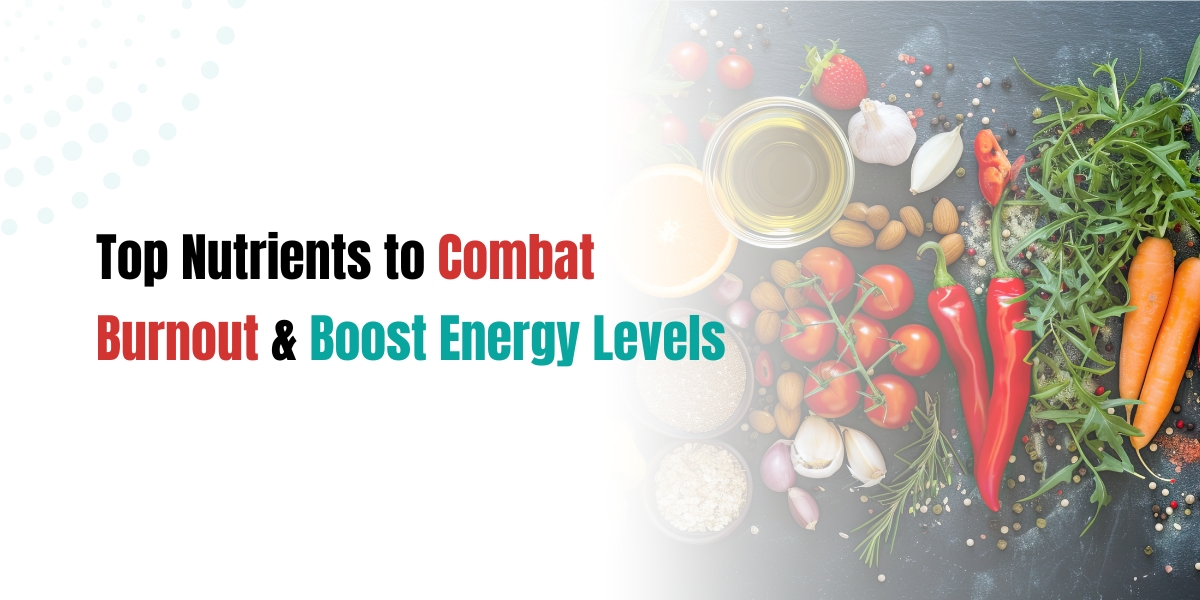
Top Nutrients to Combat Burnout and Boost Energy Levels
Your body runs onto the food you put into it. To maximize the energy your meal provides, make sure you're feeding yourself the best food possible. The body prefers to use carbohydrates as fuel because they can be transformed into glucose for energy very fast.
Nutrients are essential for preventing burnout and increasing energy levels by promoting metabolic processes, improving brain function, and lowering oxidative stress. Iron assures oxygen transmission, magnesium and vitamin C lower stress, vitamin B helps the body turn food into energy, and omega-3 fatty acids enhance mood and cognitive performance.
So, today, we will discuss the top nutrients to combat burnout and boost energy levels.
Top Nutrients to Combat Burnout and Boost Energy Levels
These are the best nutrients to keep you resilient and full of energy.
❖ Vitamin B: The Energy Powerhouses
Vitamin B, which is essential for good health, directly affect your energy levels, cognitive abilities, and cell metabolism. The vitamin B complex may maintain or enhance cell health and aid in the prevention of infections. Development of red blood cells.
➔ Vitamin B1 (Thiamine):This vitamin is essential for energy metabolism, which in turn affects cell growth, development, and function.
➔ Vitamin B2 (Riboflavin):It preserves the health of your blood vessels, metabolism, and heart.
➔ Vitamin B3 (Niacin):It preserves the health of your blood vessels, metabolism, and heart.
➔ Vitamin B6 (Pyridoxine):It is necessary for the body's proteins, lipids, and carbohydrates to function correctly.
➔ Vitamin B9 (Folate):It is essential for healthy cell growth and function, as well as the production of red blood cells.
➔ Vitamin B12 (Cobalamin):It supports the making of DNA and RNA, the genetic material that makes up the body, as well as the maintenance of healthy nerve cells.
Good sources include:
- meat
- fish
- milk
- cheese
- eggs
- some fortified breakfast cereals
❖ Iron: The Energy Powerhouses The Qxygen Carrier
Our bodies require iron for development and growth. Iron is utilized to produce both myoglobin, a protein found in muscles, and hemoglobin, a protein found in red blood cells that carries oxygen from the lungs to every part of the body.
Iron is a key component in the creation of blood. Hemoglobin, found in red blood cells, and myoglobin, found in muscle cells, contain around 70% of the iron in your body.
Good sources include:
- beans, including chickpeas, edamame beans, and red kidney beans
- nuts
- legumes, such as beans, lentils, and dried peas
- wholegrain cereals, especially breakfast cereals with added iron
- seeds such as sunflower seeds, or products like tahini
- greens, like broccoli or Asian greens
- dried fruit—like apricots
- soy flour poultry, including eggs, turkey, and fowl
- red meat
- organ meats, such as pate, kidney, and liver
❖ Vitamin C: The Stress Shield
Most cells contain trace amounts of it. In contrast to other vitamin types, vitamin C is typically found in greater concentrations in cells than in plasma, the fluid portion of your blood. At any age, consuming a daily dose of vitamin C is advised.
Lack of vitamin C causes a decrease in neurotransmitter levels in the body and brain, prolonging tension and anxiety and lowering mood and motivational energy. Vitamin C is essential for all thoughts and emotions and plays a significant role in maintaining emotional equilibrium and calmness.
All of the tissues in your body require vitamin C to develop and heal. Collagen, a crucial protein found in skin, cartilage, tendons, ligaments, and blood vessels, is made by the body with its assistance. In addition to mending and preserving bones and teeth, vitamin C is necessary for wound healing.
Good sources include:
- citrus fruit, such as oranges and orange juice
- peppers
- strawberries
- blackcurrants
- broccoli
- brussels sprouts
- potatoes
Adequate nutrition is an efficient way to prevent burnout and increase vitality. By making sure you receive enough vitamins, iron, etc., you can help your body manage stress and sustain appropriate energy levels.
Make these nutrients a priority in your diet, and you'll be more resilient and energized to face the obstacles of everyday life. If in doubt, feel free to connect with our Resiliency Program for better insight.